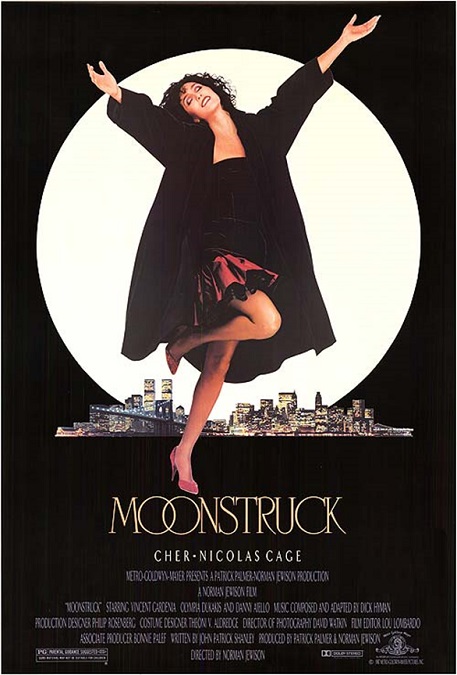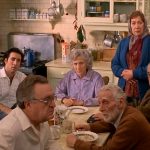
Moonstruck – 1987
I’d seen this movie before, but had forgotten how good a film it was. It was a romantic comedy, which normally puts me on my guard. The romance was quick, easy, and yet not forced. The comedy, while mild, was easy and organic, and even had a few moments that made me chuckle out loud. But it was the sweet and clever script that really caught my attention.
The movie starred Cher and Nicholas Cage in the leads. I like Cher, but when it comes to Cage, I have to fight against my biases. I’ve never been a huge fan of the actor. It’s his face. He has a face that always looked to me like he is about to fall asleep. His features are so droopy. His normal, relaxed expression leaves his mouth hanging open, and his eyes drooping, as if with exhaustion. To me, he always seems incredibly sleepy, phenomenally stoned, or just moronically empty-headed. But I know this isn’t his fault. It is just the way his features are, and has no bearing on his skills as an actor.
Unfortunately, I just didn’t buy Nicholas Cage as the romantic lead. I guess that the movie was trying to imply that Cher’s character was so physically attracted to him that she forgot all about her brand new fiancée to jump into bed with a droopy-faced man who could barely speak without shouting in anger. Ah well. Suspension of disbelief, right?
So Cher plays Loretta Castorini, a young widow living in Brooklyn Heights. She believes her first marriage was cursed with bad luck. So she accepts, though she does not love him, the proposal of Johnny Cammareri, a man who must go to his dying mother in Sicily. Upon Johnny’s request, Loretta contacts his brother Ronny with whom he has been estranged for the last 5 years, played by Cage, to invite him to the wedding. Upon meeting the tortured Ronny, tortured because of the loss of one of his hands, which in turn had led to his abandonment by his then fiancée, Loretta falls in love with him, though she tries to deny her feelings.
The romance that follows is swift and not very well fleshed out, though it was certainly sweet. But aside from their star-crossed relationship, it is revealed that Loretta’s father, Cosmo, played by Vincent Gardenia, is cheating on her mother Rose, played by Olympia Dukakis. Rose knows of Cosmo’s infidelity, which is paralleled by Loretta’s infidelity from her engagement.
But all is made right in the end. Rose confronts Cosmo and makes him promise to stop seeing his mistress. And upon Johnny’s return from Sicily, he announces that because his mother did not die, he cannot marry Loretta, clearing the way for her to marry Ronny instead. And it was that cleverly written script that really made the movie enjoyable. That, and Cher.
Really, Cher stole the show. She was bright and funny. She looked fantastic and brought an energy to the film that was fun and infectious. Deservedly so, she took home the Oscar for Best Actress. Dukakis, who also did a fantastic job, won the award for Best Supporting Actress. And as a side-note, John Patrick Shanley took home the award for Best Original Screenplay. Not a bad haul for a romantic comedy.
And I have to spend a moment explaining why the script deserved such attention. It was a neat and tidy little story. It had a period of set-up, a little development, a clear conflict, the crisis of consequences, and a clever, but believable ending, an ending that said several things. First, never give up on love because it is never too late to find it. Second, true love is stronger than safety and comfort. And third, magic still exists in the world.
And that magic came in the form of Cosmo’s moon. As a plot device, Loretta’s uncle Raymond Cappomaggi, played by Louis Guss, describes a dream he’d once had where a large and bright moon, a romantic moon, had stood over Cosmo when he had been courting Rose, demonstrating his love for her. That same moon hung over Ronny as he courted Loretta, inspiring their love. It was a cute and very romantic way to explain their remarkably insistent love for each other. Quite simply, it made me smile.








